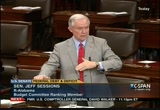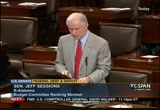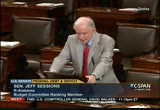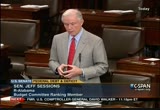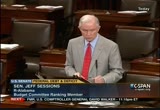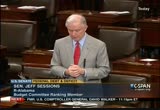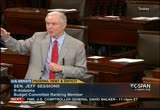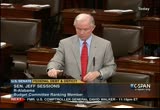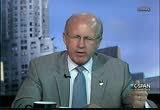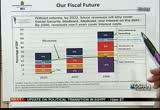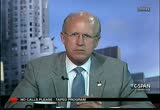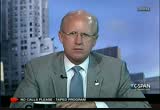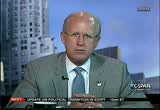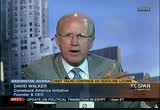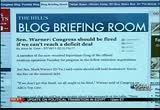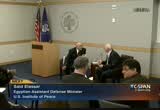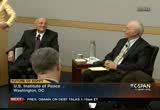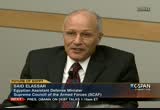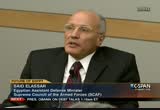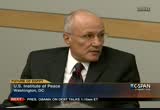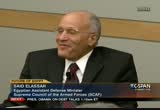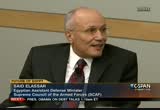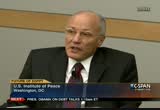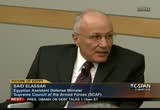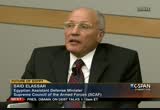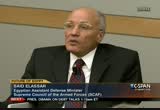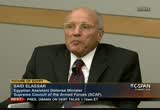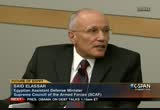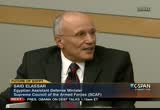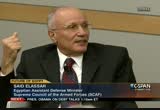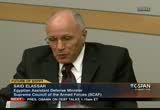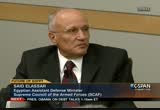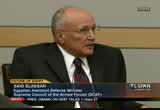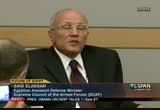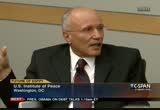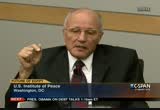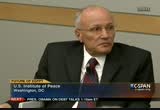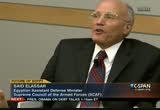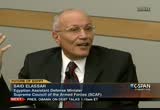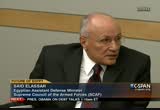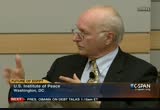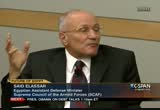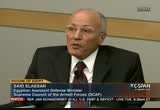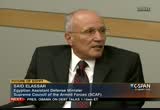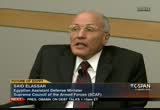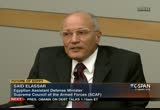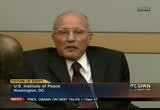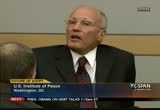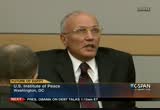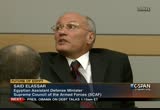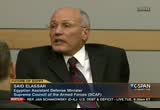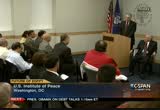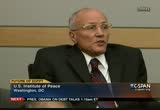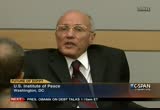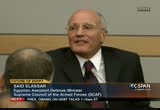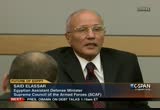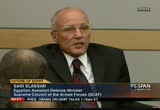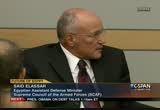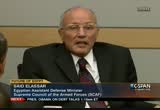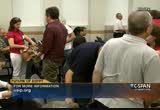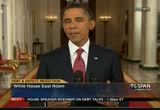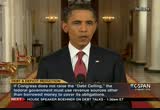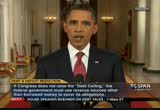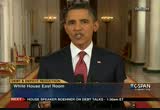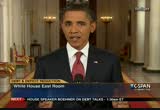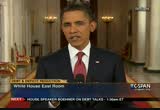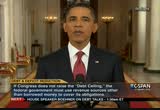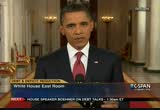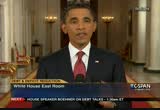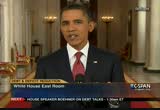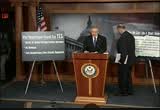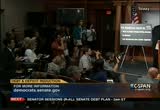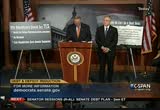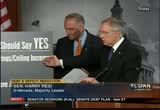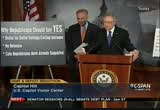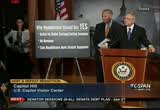tv Capital News Today CSPAN July 25, 2011 11:00pm-2:00am EDT
11:00 pm
so now under the pressure of the american people and fear of the next election, the president -- why did he reject this bipartisan agreement? well, it would require us to meet again next year and talk about more cuts because the cuts they're talking about are clearly insufficient to meet the challenge we are facing today. clearly insufficient. we've got to do more. so if you run up your credit card too much and you hit the limit and you want the limit raised, the person who's loaning the money, the american people, would like it know, have you changed your habits, are you going to do better, let's see budget, a plan that gets us out of this fix. so that has been steadfastly rejected by the leadership in this senate all year, and we
11:01 pm
knew we were heading to this debate. -- to this date. senator reid has thrown something out there. let's talk about a little bit about what it appears that's in it. we've had -- the president has had a friendly press on most of the things that he's proposed. when he proposed a budget, the democratic senate never produced one but by law is to produce one. every pleas ha president has pre every year. the president produced one this year. the lowest annual deficit in that budget would be $740 billion. the highest deficit president bush ever had was $450 billion
11:02 pm
and he was criticized for that. the lowest he would have in ten years, $750 billion, and in the tenth year it's become over $1 trillion. according to the congressional budget office, analysis of his budget. that's where we're heading. that's the kind of thing that the president has submitted to us. and you know what he entad it? he said, i'm proud of my budget. it will have america living within its means. can you believe the president of the united states said that? that a budget that the lowest annual deficit would be $700-plus billion was living within our means? he said also, quote, "it would add no more to our debt." and his budget director, mr. lew, jack lew said the same thing. breath taking.
11:03 pm
so forgive me if i am a a not buying into a proposal on one page. it was produced this afternoon, said we're going to reduce the deficit by $2.7 trillion. forgive me if i'm not buying that that until i see it and it's been scored. that's what i think ought to happen here today. by the way, you've heard the debates, and speaker boehner used this phrase and others have used it, "we want to have dollar-for-dollar spending to debt reduction." and what in a means -- excuse me, a debt ceiling increase. twha means is, if you increase the debt ceiling and allow the government to borrow another $1 trillion, you should cut spending by $1 trillion.
11:04 pm
that's just a rough idea. i don't know how they came up with that. that's what they came up with. remember, the debt is still going up every year because we're still spending more than we take in. just remember, however, this is like wimp yivment in old popeye's cartoon. winpy said, give me a hamburger today and i will pay you tomorrow. "what this is is you're going to get an immediate ability to borrow $1 trillion, $2 trillion more, raising debt limit that much on a promise that we'll reduce spending by that amount over ten years, not one year, ten years. so this is a dangerous process. this is the kind of rhetoric that's put us in the position that we are today that 40 cents of every dollar we spend is borrowed. it's what's threatening the financial future of our country, this kind of thinking in washington.
11:05 pm
and we've got to change it. we've got to get honest about our numbers and as the rank republican on the budget committee, i feel an obligation and our staff is eager to see the legislative language, not a one-page outline, about what will actually happen with our spending. we want to be sure that the promises made for this bill are more accurate than the ones president obama made what he said his budget would call for us to live within our means when it plainly does not. i'll just mention a couple of things at this point that jump out at me from the one-page outline that we've seen. majority leader reid talks about his plan would reduce spending by $2.7 trillion. but really it appears to
11:06 pm
represent a $1.2 trillion or so reduction in discretionary spending, and the rest of it is accrued by other -- in other ways. speaker boehner's proposal has a discretionary spending reduction of about the same, but what's obvious is that speaker boehne boehner's commission that would reduce spending more has a target, a goal, to reach an additional $1.8 trillion, whereas the points produced by senator reid mentions a commission, but it has no reduction required in spending as a part of the duty of that commission. they don't have any obligation to produce a reduction in spending. but what else is here?
11:07 pm
part -- the other factor is that we are now drawing down the cost of our military efforts in afghanistan and iraq. last year we spent a little over $150 billion. this year we'll spend a little over $100 billion. and the plan is to soon be down to at least $50 billion in two or three years. so over the ten-year period there'll be about eight years at nearly $50 billion or so spent on the war instead of $150 billion. that's part of the plan that we've been operating on for a long time. $150 billion for the war is not baseline expenditure of the united states. it was never projected to continue at that level, so hopefully we could bring it below $50 billion. maybe we went get to $50 billion. i don't know. but what is the reasonable estimate? i think the house republicans
11:08 pm
and the president said it would drop to $50 billion, and that would be the baseline out there for the rest of the time. that's $1 trillion. that's $1 trillion. so you take $1 trillion out of the $2.7 trillion, you're down to $1.7 trillion. and another thing that's scored in that, since that $1 trillion in war costs is scored the way mr. reid scored that, which is phantom money, it is not a real reduction in baseline government spending. it's always considered to be extra war emergency spending. but he claims interest savings on this money. so another $200 billion. so now you got about $1.2 trillion right there overstating his cuts in the elimination of
11:09 pm
the war. speaker boehner does not do that. his numbers are far more accurate and honest and realistic, really the only way to properly account for them. another thing i would just point out is when you talk about spending and how you account for it, you have to know what the baseline is. one reason this country is broke and is in financial crisis is because we claim we're cutting spending when we're increasing spending. the way it works is, the congressional budget office produces an assumption that we will increase spend at the rate of inflation or some other rate over a period of years. and then if you reduce that rate of increase a little bit, politicians claim they've made savings, they've cut spending. but spending is not cutting.
11:10 pm
spending is still going up. and there are various baselines out there about how to calculate this and it's very significant over ten and even more so over 20 years. so you hear people saying we're cutting spending. under this plan that they're going to cut -- speaker boehner or senator reid, either one of those plans i am confident will show we are spending a good bit more money in the tenth year of their plan than we're spending today. and this is confusing to the american people. i'm really convinced that the only way we can honestly compare the plans is to go back to the basic -- the way families do. do you increase your spending or you don't increase your spending based on what you spent last year. and we have a flat level and how much do you increase it over one year, two years, ten years? how much does it go up?
11:11 pm
that would be the way to do it, and then you can compare plans. then you can see what senator boehner has, congressman ryan had in his budget plan for ten years, senator toomey proposed a very thoughtful ten-year budget plan, balanced our budget in ten years, not easy toad to do. he did it. we need for thinking like that. and get away from this confusing mishmash and claim that i'm saving $1 trillion when nobody plans for us to be spenting $150 $150-plus billion on the war in iraq and afghanistan for the next ten years. that money has never been projected to be spent in that fashion. so, mr. president, we are in a situation where it's important for the country to reach an
11:12 pm
agreement. we need to pass something that raises the debt ceiling in america. i thiet say that, but that is -- i hate to say that, but that is a fact. it would be too disruptive not to do that. but, in exchange for that, as a part of that process, we truly need to start bringing our house into financial order. we are in disarray and disorder. if we were to do that, we can leave this a better country for our children and grandchildren. i know some just want to surge spending and then raise taxes to pay for it. defense department last year got about a 2% increase, 3% increase. next year it's projected about a 2% increase in some of the
11:13 pm
budget numbers. may well not happen because we don't have even that much money. but do you know how much non-defense discretionary spending increased during this time of record deficits under president obama's leadership? not counting the almost $900 billion in stimulus money, not counting that. baseline, non-defense discretionary spending increased 24% at a time we're suferght biggest deficits ever. president bush never had any increases in baseline spending like that. never. it's just stunning. we had a huge majority in the senate, huge majority in the house, the president wanted his investments, and he got these huge increases, and then they want to raise taxes to pay for it and keep it up there and maintain it. and we can't afford maintaining that kind of level. we've got to bring it back down to 2009, 2008, 2007 levels.
11:14 pm
the country is not going to go bankrupt, broke, and people not going to be thrown into the streets if we make -- we return to those kind of levels of spending. and if repaycheck those tough choices like -- and if we make those tough choices like cities and families are doing autumn over america, we can get this house in order. that's what we're going to have to do. so i look forward to studying the plan put forward by the majority leader, the study -- the plan put forward by speaker boehner. the american people need time to know what's in it. what's in either one of them. what it's going to mean to us in terms of taxes and spending and deficits. interest raiments. and then congress needs to have time to vote for it. and i again repeat my deep frustration that we have not conducted this in an open, public debate for months now
11:15 pm
utilizing the established senate procedure, the regular order but have attempted to solve this big problem in secret, behind closed doors with just a few people. i believe that is contrary to the historical understanding of the role of congress and i'm not happy about it, i oppose it and i object to it and i expect an appropriate amount of time to consider whatever plan comes >> with titles like "slander," and coulter has something to say. now, your chance to talk to the best-selling author. in death, for three hours starting at noon on both tv. >> the former u.s. comptroller general david walker of the
11:16 pm
nation pose a growing debt and budget deficit challenges. from "washington journal,", this is 30 minutes. the former u.s. comptroller general and now founder and ceo of the comeback american initiative, david walker print a good morning. forve said it is a bad idea the congress and president to flirt, so to speak, with the august 2nd deadline of hitting a possible debt default. what do you think is going on right now and are concerned there is not a deal in place yet? guest: i am concerned. if everybody is true to their word, and congressional leaders of both parties and the president, they will reach a deal at the last minute. they have all made a commitment to the american people that they will raise the debt ceiling and not the fall. what we're seeing now is they're coming down to the 11th hour, which i think is inappropriate,
11:17 pm
but typical for washington. the democrats are trying to get as good of the deal as they can and so are the republicans. if they do not reach a deal, they should be held accountable. it is irresponsible not to raise the debt ceiling limit. at the same time, we need to start putting our finances in order. host: has seven in the economic fallout, do have concerns a deal has not been reached -- has there been an economic fallout, anti you have concerns the deal is not been reached? guest: callers have already started to adjust their behavior. if enough people start to do that, it could have an economic and pack. i think the markets have not reacted to an extensive because they believe the elected officials will deliver on their commitment, that there will be a deal. here is the key. it is not just a matter of raising the debt ceiling limit. it is whether or not they do something meaningful to
11:18 pm
demonstrate to the credit rating agencies, to the farm lenders, and the american people that they will start taking steps to put our finances in order because they are out of control right now. host: i'm going to read from an abc news piece online. some people can leaders are doubtful armageddon-like consequences will come to pass. they say they're not afraid of the deadline. republican allen west put it, or in the words of jim jordan, ohio, it is not like the world in august 2nd. what is your interpretation of this message? other house republicans have echoed the opinion there is nothing to be concerned about. what is your message to them? guest: the truth is, nobody knows for sure what will happen if the largest economy on earth, the world's temporary superpower, 60% of the currency,
11:19 pm
has a technical default and has to decide which bills it will pay in which it will not pay. filipinos. the fact is, those statements are totally irresponsible. when the world would you want to pay with a tactical nuclear weapon? that is what we're dealing with. we do not know what will happen if it goes off. at least we are experimenting with real nuclear weapons but we have not experimented with this. those statements are irresponsible. host: david walker is our guest. here are the phone numbers to call to join the conversation -- host: if you manage to get through on the funds, turn down your tv. -- if you manage to get through, turn down your tv. david walker, what is the
11:20 pm
scenario you like to see happen next couple of weeks? you have laid out some possible ideas, some solutions to this situation. what would you ideally like to see happen? guest: i think we have to be realistic with regard to what can happen before the 2012 election. both parties have a different view about how to put our nation's finances in order. right or wrong, significant number of republicans have taken the pledge dealing with taxes. interestingly, we can achieve comprehensive tax reform that will end up generating more revenues as part of running the base, lowering rates that will generate more revenues and not violate that pledge. but we cannot do that before the 2012 election. we're going to have to reach an agreement to increase the debt ceiling limit, hopefully, enough to get is passed the 2012 election.
11:21 pm
in exchange for specific cuts that will equal or exceed that. we cannot please get $1 trillion at of defense over the next 10 years, at least $1 trillion out of health care and other expenses including interest expense, and lots of ideas are laid out in restoring fiscal sanity report. ultimately, we will mean more revenue. those revenues will have to come as part of comprehensive tax reform. realistically, that will not happen until after the 2012 elections. host: in coming from twitter. guest: we do talk about drawn down forces in southwest asia to 45,000 of the end of 2014 under a pre-emptive scenario. if a of a debt crisis, we will have to draw down a lot faster.
11:22 pm
we could save a lot of money from reducing our presence in southwest asia. but the pentagon has become a bloated bureaucracy. it has a tremendous amount of overhead. there are a number of other ideas that would allow us to be of a cut tremendous sums from defense without compromising national security. >host: republican line, north carolina. caller: i would love for everyone to go out there today and bought the book by ann rand in 1957, depicting a exactly what is happening today. if you keep penalizing the producers, the ones supplying the jobs, penalizing the producers, there is not going to be any more money to do anything with. people are not going to be able to survive to get food to
11:23 pm
anything. people that are not producing keep having a hand out. if you keep giving it to those in penalizing the producers, then the producers are going to end up with their hand out. they're going to be stricken with their hands tied. guest: the me come back if i can. i'm familiar with the book. it has been read by millions of people. it is a very interesting book. i guess the issue, let's touch on the tax aspect read it right now, 51% of americans do not pay any income taxes. they pay payroll taxes. the problem is, this peril taxes are not adequate to fund medicare, social security. you cannot have in a democracy and majority of americans growing not contrary to the constitutional rules of the federal government.
11:24 pm
the median tax rate is 18.8% grid that is how warren buffett secretary and the pain more tax rate than him rich his income comes primarily through capital gains, which is taxed at 15%. in this report, we talk about how to engage in comprehensive tax reform that will improve economic growth, and hence our posture, whichever one is contending a fair share to generate more revenue. that is very important read by the way, it would not violate the tax pledge, although, i believe such pledges are totally inappropriate and should be rescinded and rejected. host: we're talking with david walker. without reforms by 2012, will only cover social security, medicare, medicaid and interest
11:25 pm
on the debt. 2046, revenue will not even cover interest costs. we can see last year and 2022 and 2046. you can see the time line or the revenue is an honor the things that have to be spent for and money is allocated to. let's go to a comment on twitter. if we had a downgrade, would it be that bad? we would only be downgraded to aa rating that is still a pretty good bond rating, in my book. what do you think, mr. walker? guest: we would have to pay higher interest rate, but how much higher would they be? you just saw that graf that showed under our present pact based on historical levels of revenue about 18.2% of the economy, the only thing we could pay for in 2046 based on the current pact is interest. that is without a significant increase in interest rates. by now we have historically low interest rates, but that could
11:26 pm
change dramatically if our credit rating changes. for everyone% increase, 100 basis points, about $150 billion a year in interest. what you get for that? as we say in the south, shinola. nothing. host: we go to the democrat line. caller: first of all, i am truly upset. if i do not talk intelligently, please, excuse me. greed, greed, greed. the rich and powerful are getting rich and powerful. the rich and powerful are hellbent on destroying this country because of the fear of losing their money. we should raise their taxes on their rich. i am paying taxes big time on my life. the thing is, i am so upset with the ignorance, with the calls that come in. it is devastating to say the
11:27 pm
rich are helping the poor to get jobs is absolutely ludicrous. i am so upset because there is a goal to tear down the little guy. of course the goal is to destroy obama, which is unspeakable. the middle class and the poor are suffering. all because of money. money, money. that is what is so upsetting to me. guest: there is absolutely no question there is a growing gap between the haves and have-nots in the world and the u.s. as well. it is not just an issue of wealth. it is also an issue of education. important, the comprehensive tax reform that is outlined in the comeback america restoring fiscal sanity report under both from march would end up resulting with everybody and that making more than a stated
11:28 pm
percentage will pay something. those who end up having more and make more will pay more. we will have an even more progressive tax system. but the way we do it is through comprehensive tax reform that will end up making sure we equate taxes on labor, with taxes on capital. we will have a more economic system that is more vibrant and will stimulate economic growth and generate more revenues at historic levels. host: maryland, independent line. caller: social security is overrated. if you want to be poor, make your plans to live on social security. i have social security, 7.6% of my income a whole life.
11:29 pm
the other is a vanguard account. we pay 10,000 a year on vanguard. we have it for eight years. with all of the recessions, we got $1 million. we have been using that for 10 years. we did it ourselves with the difficulty. on the other hand, we put in about $300,000 to the federal government -- a pension plan is when you put your money into overtime, it grows. when you allow the government to take over your retirement, you get what you deserve. that is a threat with the president of the united states saying, we may not be able to give you your money.
11:30 pm
we have been hoodwinked. guest: a couple of key points. social security is not a pension system. it is a show shall insurance system where there are survivors benefits. it was never intended to be the sole form of retirement income. it was intended to be a foundation. like with a house, you have to add to the foundation to have a habitable drill -- dwelling. over 56% americans rely primarily on social security. it is paying out more than it is being paid into. it can be made solvent come sustainable, indefinite leave.
11:31 pm
we did that by laying out of this report in fiscal insanity. -- fiscal sanity. the younger you are, the better off you are financially. we need to get our savings rate up. pension plans, other vehicles. we need to move through some type of universal savings arrangement, because the system we have now is not working. host: the founder and ceo of the combat americas initiative. -- come back america initiative. new york, republican line, joining the conversation.
11:32 pm
caller: thanks for taking my call and thinks mr. walker for his years of service that has had an impact on some aspects of american life. the question i want to pose to him is that, one of the reasons i believe congress, senate, and the presidents are having a problem developing a consensus on this issue is that they cannot send the debt ceiling without addressing structurally to some aspects of the deficit in terms of how we are going to pay for it. i believe the rating agencies have sat with both the senate and house of representatives lives -- they can extend the debt ceiling without addressing the deficit in a meaningful way that they could still risk having the country's credit rating fallaway. is that true? guest: that is true.
11:33 pm
there are two issues. raising the debt limit. they have to recognize the u.s. garment spent $4 billion a day more than it has taken in. what is going to be done in conjunction with raising the debt limit. we have to demonstrate that we now know we are living beyond our means. we will take steps to put our finances in order. we cannot spend billions of dollars a day more than we take in without having a day of reckoning. we need to do something meaningful. we have to recognize what we are doing now versus what we are doing later like social insurance reforms. we have to recognize that some things will not be able to be done until after the election.
11:34 pm
comprehensive health care reform -- we have to engage american people with the tough choices. they deserve to know and to hear what the proper path forward is. host: would it be less contentious if we had not entered an election year? is the political element heightening this here? guest: no question. close margins in the house and senate. they want to keep the house. president obama wants to get to be elected. republicans want a republican elected.
11:35 pm
there are pressures on the right into the left. never say never. it is fine to make a commitment to one's constituents, but to take a pledge to special interest groups on the right or the left is inappropriate. there is a reason why we have this stalemate. we are headed off a cliff if we do not change course. host: next caller. caller: i am very angry with boehner. republicans are stalling the economy under this president so they can make sure they have the voters so frustrated so that they be elected the same bunch that put us out in this heavy
11:36 pm
deficit situation right now. they are using the port to play political games with that this president and cutting back is to lay off people to cause unemployment to go up, cutting important programs and social organizations that we need to make unemployment go up. they are using the american public naiveness. barack obama came to the meeting table several times. when he tries to give them what they want, they say no.
11:37 pm
host: she brought up raising taxes on the wealthiest americans. guest: i understand that you are upset. many americans have gone from concern to discussed. the american people are smarter than people give them credit for. if it looks like one party is disproportionately responsible, and we do have a u.s. debt crisis, they will be held accountable at the polls. it is important that we work together to reach a reasonable compromise, because all of us will be affected one way or the other. our fiscal situation is so challenging that he will not solve the problems by taxing the rich. if you look at our total liabilities, retiree health care, contingencies, medicare, social security, all of these things -- as of september 2010,
11:38 pm
we were in a $61 trillion whole. that is over $500,000 per household. you could eliminate all of the bush obama tax cuts, you could end up eliminating all congressional earmarks and eliminate all foreign aid, which people think is a big number, but it is not. that is about 20% of the problem. the government has grown too big, promised to much, which did too long to restructure. we will have more revenues, but we need to go about it in an intelligent way to make our system simpler, fairer, more competitive and will promote job growth and innovation. under the comeback american initiative, there is an additional money for helping the
11:39 pm
economic recovery and deal with unemployment. the less spending reductions of the next few years is over $3 trillion. if we do not put our finances in order, we will have a lot bigger problems in the future. >> congress should be fired if they cannot reach a deficit deal according to senator warner. you started off this segment same congress needs to take action. there is a problem with their effectiveness. a but point to you think congress will be fired?
11:40 pm
guest: the american people decide whether or not to read- hire another member of congress. we have another election coming up in november 2012. no deal, no pay. they are one of the first ones to get cut off, because they are not doing their job. and no retroactive pay either. we have to open the recognize that both political parties are responsible for where we are. spending has been out of control, especially since 2002. we have made more promises than we can afford. very few tax cuts pay for themselves. we need election reform. we need denigrated and --
11:41 pm
integrated reform and term limits. we do not need career politicians that are more concerned about getting reelected and doing their job. >> you may run for office in the state of connecticut. are you looking at that possibility? among those pushing you to run is the national republican senatorial committee. why would you run? guest: i was an independent -- i am an independent and was a republican prior to that. i do not like politics or career politicians. my view is our country is at a critical crossroads. the decisions that need to be made will determine our
11:42 pm
country's future and whether the future for my grandchildren and others will be better in the past. i have ticket -- decide if i will dedicate the rest of my life to this type of public service. i am thinking about it, but i am not going to rush into any decisions. host: your political alignment has changed over the years. you have taken a break from one political party. how would that affect your run and where would you sit? guest: i was born and raised in alabama and florida. if you were a democrat, you were disenfranchised, because of the elections were decided in the primaries. i went from being a conservative democrat to a moderate republican.
11:43 pm
i was ahead of the wave. in a job, you had to be independent. i decided to become an independent. i remained one when i left that job, because it has put me in good stead. i have been able to deal with republicans and democrats. many americans are independent. you do not have to run with one of the parties or you could run as an independent and with one of the parties. i would have to decide that down the road. host: david walker is president and ceo of the comeback america initiative. he served as the comptroller general of the united states and head of the u.s. government accountability office for almost
11:44 pm
10 years. let us go to massachusetts on our independent line. caller: thank you, mr. walker. you have talked so much common sense this morning. i do feel from what i have been listening to that republicans have been for tax reform. i am very frightened with what i hear. all i hear is about of class warfare around a blame game. i think both parties are totally responsible for where the country is today. i do not think singing who did what will solve anything. we need a wake-up call in this country. american people better wake up. we are in serious trouble. host: what do you think it is going to take?
11:45 pm
caller: we need to cut our spending. the american people will have a hard lesson to learn. we are spending too much money. guest: i agree with you 110%. both political parties are responsible for where we are. we can blame a lot of people, but it is sought. to be productive. we need to recognize reality. the government has promised to much, grown into big, which it long to respond, spent more than it has. we need to make sure that we discharge our constitutional responsibilities, have a sound in some credible safety net for those that truly need it, while doing things to grow our economy, make sure people pare their fair share with regard to taxes. that is what restoring fiscal
11:46 pm
sanity and this free market does. republicans are for comprehensive tax reform, and so are democrats. we will do a comprehensive tax reform, but not get it until after the 2012 elections. we can do it in a way that would make our situation better. we have a spending revenue problem. we need to start soon to make these tough choices so the american economy can work for us and not against us. > host: a question on twitter. instead of paying 6%, we may play 22%. -- pay 22% if we fail. could that change the bond rating? guest: it is not going to take
11:47 pm
that dramatic a decline on the first step. we are not saying 6% now. that is what the scary situation is. we have historically low interest rates. people are not buying our bonds. we can sell short-term debt, because it is still a safe investment relatively. investment rates go up and we will feel it very quickly. we have a lot in these low rates over a long term. that is the risk. our risk could be downgraded if we raise the debt ceiling limit and does something credible to demonstrated that we will start
11:48 pm
putting our finances in order, dealing with out-of-control spending and other expenditures. host: john, republican caller. >> i see your point of a few my question -- i see your point of view. what can be done to rebuild the small business of america under 500 employees. i think that is the key to revenue. i do not worry about big corporations. congress has been irresponsible. they have permitted wall street to be the same, during the last
11:49 pm
10 years or maybe prior to that as well. how important do you think it is if you believe it is? thanks. guest: small business is the engine of innovation, growth, and job creation in the united states. one of the things we have to recognize is we need to provide for certainty with regard to our tax laws, regulatory structure, and we do not have either one right now. the u.s. government needs to do a lot more to help small business with regard to exports. major corporations do not have a problem. they do not need help. small businesses do. we can learn from japan actively
11:50 pm
partners with business to promote japanese products and exports, even in a free-trade world. there is a lot more we should be doing to stimulate that part of the economy. host: bipartisan trio says tax or 0 -- they are offering a tryst on the chronic funding problem. bill bradley, and our guest, david walker, says levin taxes on oil would drive down oil contentions. set the scenario for us. guest: this is an example of how the federal government has gotten totally out of control. i partnered with former senator bill bradley, a respected republican that is a former
11:51 pm
governor, to talk about non- partisan solutions that can get bipartisan support. the structure is deteriorating dramatically. i live in connecticut. i can literally run faster than that train goes between new york city in the stamford conn.. most of our investments is not based on economic situations. the so-called trust fund that was supposed to fund our surface transportation is dry. we now are generally -- if you look at other countries, every other country into having a self sustaining critical infrastructure system.
11:52 pm
the plan for making investments is based on natural considerations plaint -- planned well in advance. so you can plan intelligently that will stimulate growth and stimulate jobs. we need to learn from others. this is a comprehensive plan to put us on a more sustainable path. it is an example of what needs to be done, because the u.s. government is largely based on the 1950's. the world has changed a lot since then. host: democratic caller, boynton beach, florida. caller: we seem to be spending quite a bit of mining on students' education, but they are not prepared, and they do not have a good life skills. they claim they do not have enough skilled workers.
11:53 pm
they encouraging education by providing grants, assistance, and money. we also hear there are some states where people are paying for the busing of their children. this is supposed to be part of the education process. people are being put upon so severely to pay for things that citizens are paying for through their taxes. they are claiming they do not have enough skilled workers, and they keep bringing people into this country from other countries to do jobs that our own citizens should be able to do. about this. talk there are two systems in the united states where we spend
11:54 pm
double per person as compared to the average for industrialized nations, and we get an average results. we spent double per person and we get below average results. k through 12th education and health care. the system is broken. you cannot throw more money at a system where you are spending double and not kidding result and expect things to change. we cannot compete on wages. we have to compete on a scale, -- skill, innovation, and those types of things. the world is moving to an economy based on brains. we need to have several paths. some of our students, no matter what their gender or race or ethnicity will not go on to
11:55 pm
college. others will be trained in trades. we need to do a better job in financial literacy. other sectors should be doing more. we should have more charitable contributions the truth is, the not-for-profit sector is going to be more important as remove afford and as the government restructures. host: here is a list of the fiscal fitness index. the united states is 28 on the line. what can the u.s. one from these other countries?
11:56 pm
guest: we can learn a lot. we are not as great as we think we are. we have lost our way. we have a tendency to think that we cannot learn and not from others. that is flat wrong. australian, is zealand, sweden, have risen to these challenges. we need to learn from others and from history. a travel over 90 countries around the world it has been part of my makeup to look to others to learn the positives
11:57 pm
and avoid the negatives. host: san diego, independent caller. caller: thank you for your service. you are very smart. i would love in your thoughts on various industries. did they give aig a triple a rating and then the next day went bankrupt. i would love your opinion on those people. guest: the credit rating agencies perform a very important function. they do a better job with regard to the private-sector than the public sector. there have been notable exceptions. there were a variety of instruments that were directly contributed to the sub-prime crisis that happened back in
11:58 pm
2008. here is what is important. a disconnect between who is benefiting and who is going to pay the price as the bubble burst, not enough transparency in, too much debt, not enough focus on cash flow. failure to act until a crisis is at their doorstep. there are a lot of similarities. credit agencies are starting to step up to the plate. there are starting to recognize interest rates to a greater extent. they are starting to do a better job. you have to understand what they do. they do not consider off-balance sheet obligations. if you are a foreign investor, they do not consider currency risk at all. understand what they're
11:59 pm
basically saying. i do not think we will default. we are on an unsustainable path to threaten the future of this country and the role of americans. we need to focus on it. host: "washingtonow's journal," we will get an update on the bills in the house and senate. the congressman that serves on the affairs committee and former deficit committee members will join us. and we will talk with bradford kitsch, author of the citizens' handbook for elected officials. each morning at 7:00 eastern. this week, a court in cairo
12:00 am
decided to come by and the trials of the ousted president and his former interior administer. -- interior minister. we will get an update on egypt cozy political transition next on c-span. president obama followed by house speaker john boehner on the deficit reduction talks. >> watch multimedia clips from on the justices. "the supreme court" available wherever e-books are sold. >> now discussion on egypt's
12:01 am
political transition. a military council has been running the country. said elassar will talk about what is ahead for the country. from the u.s. institute of peace, this is one hour and 15 minutes. >> i am tara sonenshine, executive vice president of the u.s. institute of peace, and we welcome you to this hopefully permanent headquarters. i also want to briefly welcome -- and i will tell you more about -- the two gentleman you see in front of you today. i welcome first our guest major-
12:02 am
general said elassar and the moderator of today's program william quandt, and i will tell you about their biographies in just a moment. let me set a few house rules. cellphones off. pagers, anything else that makes strange sounds, please turn them off. the sec rule is that we at the institute of peace following decorum, which is to say that we are polite and we encourage public discussion and debate. we welcome this agreement but always in an agreeable fashion. and setting the scenes for today's discussion, i remind you that it has been six months since the dramatic events in egypt, since the end of the mubarak regime, and since the period known by some as the arab
12:03 am
spring. the events in each of yesterday's, today, and tomorrow may well defined the contours of the new middle east and the contours of the region. at the same time, there is growing concern over how will all unfold, how it will work, the transition, this experiment in democracy. the united states institute of peace has been deeply engaged with egypt and hint -- and the many issues that it faces throughout our 27 years of work on the rule of law. nonviolent resistance, gender and peace building, education,
12:04 am
the political transition. we hope to be of service to egypt and egyptians as they make their journey. we offer courses here on political reform, diplomacy, negotiations had our academy and we have some sophisticated simulation and gaining tools that we hope will also be of use. so we're pleased today to have with us major-general elassar, a member of the supreme council of the armed forces in egypt. the military played an important role in the revolution and now in the interim governance. as someone often called upon by the military council to speak for it, i know that he is used to handling tough questions. and i know a man used to asking tough questions, and that is built quandt, a leading expert
12:05 am
on political science at the university of virginia. he is a frequent contributor to many institute of peace programs. he is author of a forthcoming book, "the piece puzzle -- peace puzzle." we will have an opportunity for questions. just get them by card, i believe, to steve and he would get them up to all of you. i now ask you to welcome our guests and we will begin the program. thank you both for being here. [applause] >> thank you very much and thank you to the u.s. institute of peace for arranging this turn out of the audience shows how interested we are in what is happening in egypt today, and what a special opportunity is to
12:06 am
have a chance to talk -- it is to talk to someone who is at the center of the decision making in a country that many of us care a great deal about. the way we are going to proceed is that the general and i will have an informal conversation, nothing preplanned. tara said i am a tough question are but i will start with some general questions to get things going. as we move along, we will go into issues into more debt. tara mentioned it was just six months ago that large numbers of demonstrators went into tahrir square on january 25, and within a few days, many of us were transfixed by watching a revolution happened in real time. it is the first time i have ever been able to watch one unfold on how to zero plus unfold on al
12:07 am
jazeera, as an outsider who is known egypt for a long time. -- who has no need to for a long time. you're watching the same events but from a defense standpoint. when did it occurred to you that these were not just another wave of demonstrations such as u.s. seen in the previous years, that this was qualitatively something different and might well result in a change of regime? can you give us a sense of in those few weeks from january 20 that the february 11, when did it become clear to you and to your senior colleagues in the military that the regime had to go? >> first of all like to thank the institute of peace -- i would like to think the
12:08 am
institute of peace -- thank the institute of peace. i am much pleased to share with you, to have the opportunity to say something about the historic moment we have been witnessing in egypt nowadays. in response to your question, in the egyptian armed forces we had the feeling prior to the 25th of january that something would happen. due to the corruption and the efforts and the efforts of the
12:09 am
former president to replace his son, and the conditions of the egyptian people at the time, we were already stating that something would happen. i can tell you that if people went to the streets, we would never fire upon our people. >> even before january 25. >> yes. >> was the possibility that the president would name his son one of the things that you had in mind that might trigger a crisis if it was announced? >> sure. >> and this was about this time of year. and you are against this. >> that was an assessment that
12:10 am
we did not announce, and there was a way to express through the minister of defense, a member of the cabinet. you can see the messages from the american embassy in cairo from wikileaks, all stating that we're against this. >> the americans, as they watched this unfold, seemed slow in recognizing the magnitude of
12:11 am
the change. and there was a moment's parents seem to set the would-there was a moment where they seem to be supporting transition from mubarak to someone else, and that also failed. can you tell us what happened in that last they are to win the vice president was also swept up in the change? >> i like to tell you -- i would like to tell you that it's started to run the 25th of july. -- january. because we are now in july. there was the glorious
12:12 am
revolution of egypt in july. >> july 22. [laughter] >> in the 25th of january, when the people rushed to the streets, we were monitoring. but the major action happened on the 28th of january, a huge amount of egyptian people in the streets, and not only tahrir square, but also in most of the streets of cairo and egypt. >> friday, i believe. >> friday, yes. we are recognize that to-we had already recognized --we had already recognized that as a
12:13 am
whole. we note that [unintelligible] we had been called to the streets and as i told you, with a pre determination, not to fire, because we felt always that we had been imposing this idea on our officers and soldiers, that the people of egypt own its armed forces. so we simply cannot fire on our honor. -- our owner. we have to support them.
12:14 am
you remember the people and the children riding the tanks and our armed forces had been received by the egyptian people. >> that was one of the remarkable moments in your revolution and in the tunisian one, which we are not seeing in syria or libya. >> and if you let me to proceed, and on the first of february, we had to tell our people about the opinion of the armed forces in this regard. we did this on the first of
12:15 am
february, and the former president was in his office. it included three named items. the first one was that we recognize the right of the people to demonstrate. to do so peacefully. at the second one, very important, that we understand the demands of the people. and if you remember the first man, -- the man, that the president had to leave now.
12:16 am
we declared that the egyptian forces did not and will not fire on the egyptian people. we determined that this communique was the turning point and for the egyptian people and for the regime. we were sure that everyone had received the message. we asked the president to have some solution with the people for 10 days. some reforms that took place for the people, but on the 10th of february and after the situation, we met at the supreme council without the president . >> this was after his speech when he did not resign.
12:17 am
>> yes, you are following me. on the 10th of february, we met on the supreme council and we announced the first declaration from the supreme council, that we are in continuous meeting in order to have the right decision in the right measure. everyone also received the message, and after some hours, former president gave up and left cairo. >> thank you for the history. that fills in some interesting gaps. i have been in egypt twice since the revolution. i want to convey a sense that i got during the trip in may that people were still very hopeful and excited about what they had
12:18 am
achieved, but they were beginning to express concern. economy, security, tariff issues, and a lack of understanding how decisions were being made behind closed doors of the supreme council. is not that they were complaining that the point about the decisions, per say, but they had the feeling that there was no transparency, they did not know who was being consulted. how is an election going to be organized? what are the rules going to be? can you explain what the processes that you go through and do you do consult with as you face it decisions about elections and parliaments and so forth? >> i could not arrange my answer
12:19 am
better than yours. by the 10th of february, we had the responsibility to manage the country. we did not manage. we did not believe that we go to this point. but it was a responsibility for us to manage the country in a very critical situation. i like to tell you the conditions of egypt on security levels [unintelligible] imagined a country like egypt without that, terrible. about 20,000 prisoners had been
12:20 am
freed from the prisoners. many ammunitions and weapons had been stolen. it caused a big burden on our children to scare the country, -- to secure the country. the armed forces is quite different from the security forces. many factors also have been negatively affected due to the administration and others. the economy was in a very bad shape. also as you said, our country,
12:21 am
if you like to damage egypt, you can do it this way. yet this problem between christians and muslims . in some places there is no problems. but the uneducated people, you can ignite the big problems between them. that was the case and day-by-day we were trying to manage all these problems. when -- with a clear from the first day that we were not -- we
12:22 am
declared from the first day that we were not a replacement for the legislature. we would have new constitution. the main objective of the transition period. and we were not seeking to proceed for this authority. and if we would free and fair democratic elections, as i said, the main change this lives these changes was the case
12:23 am
of these people under dictatorship, and the security forces had the upper hand, so that most of the egyptian people felt that they are free and they have to get all their rights sen. not tomorrow. that is a very big challenge. no government can respond to all these, and also the revolution has no figure, no leadership. to talk to them to convince them
12:24 am
to share sacrifice. they would like to have more positions and so. it was a big challenge. it took patience from us to manage to ask the experts in the constitution and the economy, and the big challenge is that the demands of the people has only political backgrounds, but their decisions would have the economic background and security
12:25 am
background. so our decisions appeared has slowed to the people. but it was not slow. if you see the achievements and six months, you can see supra issue intrudes -- the biggest achievements. now people are recognizing that there is excess success we have the following procedure. polish that there is excess -- that there is success we have to follow and proceed.
12:26 am
they have many demands. >> to you try to meet with them? >> have met with many factions of them. i am not saying that they are not good, but every group or person has his agenda, his demands, and it is absolutely -- no government in the world can respond to all of these collective demands. we have enough patience to deal with them and we are committed until this moment that the fire on it in the egyptian people under any circumstances.
12:27 am
not to fire on egyptian people under any circumstances. >> my understanding is that it has taken a long time to get to elect or rules developed. we would have expected that law some time ago. there is a commission that is about to issue a report and we have heard some preliminary ideas that you'll have a combination of individual and party candidacy. as a local scientist, i can say that there is no right way but you're using a model used in the palestinian elections in 2006. that model produced a victory for how moss. -- hamas.
12:28 am
that met in helps the most disciplined group. so you may be choosing an electoral model that has unanticipated consequences. one of which could be a strong showing by the muslim brotherhood or their new party. does this concern you is this -- is to go into the parliament responsible for setting up the constitution? getting the new institutions in place? or is the outcome, as long as it is free and fair elections, the not concern you? >> limit to you about all the secrets. [laughter] >> that is what we want.
12:29 am
>> many lawyers and people working in democratic institutions talk about what works here. we arranged a national debate in order to have feedback from the political factions. we already had some feedback. some will have one-third of the peace, and individuals will have two thirds. also, [unintelligible]
12:30 am
12:31 am
their main point of the half and half is that we are worried that it would be -- it would not be from a constitutional but some objection if we proceed half and half and represented as not for equal rights for individuals. we let the members of the party nominated for the individuals and the other also. >> you can the provision that half the members of parliament should be from a peasant or worker background. >> yes. >> that is out of the old constitution. >> we let it into the new
12:32 am
constitution because the country nowadays, if you cannot afford more problems from the locals and from the farmers. it would be elected from all the people of the chip and we will see that they can change if they have the right to change. >> you have decided no international monitors. >> we are now dealing with the election laws. you cannot respond never. many opinions are in all directions and we tried to respond on some. >> all the partisan groups have had a chance to. >> yes, yes, sure.
12:33 am
concerned about the objections from the court of the constitution. it would make great problems, because this parliament will issue the constitution. the president would be elected through their loss. the best their loss. -- would be elected through their laws. we're ready to receive any monitoring from egypt, and also the foreign experts can visit egypt, but not on the basis of monitoring or observing.
12:34 am
>> let's move on to get to a couple of more topics. during the revolution, one of the slogans heard frequently is that the people and the army were one hand. the last few days, there have been demonstrations marking on the defense ministry and criticizing the military. is something beginning to change? >> no, we have to appreciate from the last -- last regime and occur regime. we're seeking to proceed with authority. it is a great burden on our soldiers, the transition period. we have no ambition to continue.
12:35 am
we have been adopting all the demands of the people, while the former president was in his office. and if this revolution had failed, would be our future? what he would do with us, we did not think about that. it is a quite different situation. we are in a transition period and we would like to focus and successful ways. we would like to fulfill the demands of the people as much as possible. according to the challenges that we have. and your conley requested to visit egypt and talk to the
12:36 am
people. you will find, and i'm not saying because i am a remember the police -- the supreme council, but you will find a majority of people supporting the supreme council. and those groups are very minor. we're expecting them, because they are egyptians. we will not go to those measures. they have the right to demonstrate. they have the right to speak, but not the right to [unintelligible] to destroy our interests. they left the main government square for some days. they threatened to block the suez canal.
12:37 am
could you unimagined -- imagine? they threaten to block the underground. but despite all the statements and behavior, we did not have the measures. >> the mentioned foreign interventions. you did not mention which country was intervening. >> yes, yes. i would like to tell you. we have loans to buy money to
12:38 am
egypt. >> are those laws being followed? >> yes, we have a problem in this regard. there are some countries violating laws in egypt. we are worried about the borders coming in from outside egypt, from the europeans, from the americans, from the arabic states. all of the egyptian people are nationalists. we would like to have support, but not to have interference. we have laws to be obeyed.
12:39 am
12:40 am
it is a matter of sovereignty, to have some money from abroad [unintelligible] not egypt only can accept that. >> i would ask two more questions and then we will turn it over to steve. you mentioned that you and your colleagues are ready to go back to your professional jobs as military men. eager. >> that is correct. >> since 1952 the egyptian military has played a fairly prominent role in egyptian life. you cannot say that it has only played a military role but it has played in military and political role since 1952. and right now you're playing one of your most important roles in your history.
12:41 am
if the project works committee parliament company president, and we are on a new track toward democratic egypt, which many of us here very much hope will happen, what kind of role will the military still play? there are two models that i have in mind. one is turkey in the 1980's, the markets of return, but the military seeks of the privileged outlook for stability and overseen the constitutional order, just in case things get out of hand. and that is now being contested in turkey as they try to regard the constitution. the other model is the military purely in control. the citizen government comes in and you actually take orders from us. which do you think we will see two to three years from now?
12:42 am
>> i can answer you in different ways. staff and all of the constitution, the new constitution of egypt, it will define the role of the armed forces. the new parliament will form the new constitution. it would be responsible to draft the constitution and prepared to the people of egypt in a referendum. and that the people of egypt and accepted this new constitution, it will be ok. [unintelligible]
12:43 am
there is major change has happened in egypt. i like to assure you in this regard that we're not an extension of the last regime. the egyptian armed forces, we are owned by the egyptian people. and we're proud of that. and we would like to be ready to play everybody. >> the last question i have is on farm policy. three foreign ministers since the new regime.
12:44 am
there were early indications during one foreign minister that there would be some changes, the opening toward casa, encouraging palestinian unity, even hints that relations with iran might change. in the other two toward israel might be cooler. he is moved onto other things. but in terms of farm policy, -- foreign policy, d.c. that egypt will be in a position of continuity with its foreign affairs or are you trying to bring your farm policy more in line with his public expectation? this is an area where you are still in charge.
12:45 am
in that context, tell us about u.s.-egypt relations? >> let me start with the last. . in addis states and egypt's relationship. we have a very strong, strategic relationship that and started. [unintelligible] we considered it a cornerstone of the entire relationship between the united states and egypt. we had been supported by others , and i would like to see this
12:46 am
proximity, and thank you for your diet will support for egypt in we are proud to be an important element in the national security of the united states. and we're proud that our contribution to the united states is tremendously important. on the full respect for the american military and i do believe that we have the same respect from the american military to the egyptian military. we have a good relationship but in the ups and downs, it is normal, but we are sustaining
12:47 am
excellent relationships. in my visit every year, i have the objective to expand and enhance this excellent relationship. that is with respect to the united states. with respect to other commitments, i would like to remind you that after one day of our responsibility, we assured to the international community that egypt is committed to will agreements -- all the agreements that we signed before. [unintelligible] the pieces are strategic option. no change in this regard at all.
12:48 am
please let me say something about the revolution in tunisia. it affected the media so much in many of the issues including the foreign relations in egypt. with a spectral ran, -- with respect to iran, we have an ambassador and bahrain. one ambassador and another for the islamic conference. [unintelligible]
12:49 am
i assure you that despite all allegations appeared in the media and with with a crossing, no change also. that crossing had been opened by turkey about one month in june 2010. no change in that crossing. you cannot find any change in our foreign relations. but i would like to assure that our transition. i -- our transition period from
12:50 am
the people and democracy, they had to listen to the public opinion, and you will not find one person in egypt to convince him and to take a decision you would like to take. you will find inshallah a democratic country in the international community, and we ask you to consider these changes not only in egypt but to examine all the issues, especially the palestinian issue and the syrian issue and 11 non issue.
12:51 am
-- the 11 bond issues. israel has to comply with this. >> thank you very much for your conversation and we will turn it over to steve now. [applause] >> let me thank them for getting us off to a tremendous start. not 500 questions here, but 37. we face a bit of a dilemma. begin either answer one question every 15 seconds, or i have tried to combine the questions. i hope we will understand if i do not get to all of them. i think it really is a testament to a level of interest that your visit generates that we have this number of questions to pose to you. there is an extraordinary focus right now on egypt, and from a
12:52 am
certain level of concern in skepticism about some of the decisions and practices that have defined the work of this. california was very evident in the questions. you are used to facing tough situations and i hope that that spirit will continue as we began with some of the questions from the audience. a lot a star with a question -- i want to start with the question. we are always deferential, even when we are expressing sharp criticism. you do not need to be concerned about that. profs quandt ask about the constitutional process. let me continue with another question on constitutional development. we have heard a variety of different perspectives from members of this about the role
12:53 am
of the military and the design of the constitution. rather than pursue that issue directly, aren't there any redlines concerning the constitution that the military is particularly concerned about and will take steps to ensure are not crossed in the constitution is designed. and if so, what are those redlines? >> i ask you to trust me and believe me. the new constitution is the responsibility of the coming parliament. it will be freely elected from the people of egypt. we do not know about the contents of the new
12:54 am
constitution. we're hoping to have full democracy in our country and have a new era in the history of egypt, to build our civilization and to put egypt in the appropriate way or value, we hope. >> another subject of significant interest concerns the forthcoming parliamentary elections now scheduled to take place in november and the role of international observers in those elections. again this is surface, but i have a question that presents this concern from a slightly different perspective. i would just read the question from my colleague here.
12:55 am
you've stated as such an observer team would be a violation of egyptian sovereignty. why? far from undermining sovereignty, many observers in indonesia and other countries have been welcomed by opposition parties because their presence strengthens the integrity of elections and can in doing so strengthen national sovereignty. u.s. allows and facilitates on election observations. we have missions in the united states. when not been that fit egyptian democracy and sovereignty to break with that path and work with foreign election observers? [applause] >> how like to thank him for his question. i would assure him that the
12:56 am
supreme council is committed to free and fair elections. it is the commitment to our people in egypt. this gentleman has the right to ask, but we also have the right to have our position. >> if the supreme council received requests from international observers from local organizations, would you allow that? >> shura, the local organizations are welcome. monitors, not observers. they can visit the election
12:57 am
facilities and see with their own eyes. >> during the uprising in january that ended with the departure of hosni mubarak, women in egypt played a particularly visible role. and the uprising has been seen as an opportunity to integrate women into the political arena in egypt in a much more comprehensive fashion than in the past third we have a question from amnesty international. many in the human-rights community are concerned with the dire lack of political participation in inclusion of women in each of's transition process. can you discuss the possibility of implementing mechanisms to ensure full gender equality and constitutionally guaranteed participation? >> in the last election, we put
12:58 am
12:59 am
we have a problem in egypt that in every house, you have dictatorships. from our women. [laughter] we are suffering that dictatorship. >> i suspect some of the women in our audience are not giving you a great deal of support. >> one of the aspects of the role of the military in egyptian society that has come under most scrutiny and the last five months is its economic role and its economic interests. the measures that the egyptian military might take to protect its economic interests. how question from the egyptian american association for change. it is a three part question. with the military council object to a constitution that would give the parliament power to assign the budget of the
1:00 am
military, monitor military expenditures, and prevent the military from running businesses, and subject the military to polymeric financial oversight? [applause] the >> i am sure he did not listen to my answer. we have no business about drafting the constitution, the constitution the members of the coming parliament will have. caught on, or -- i would like and to try to include what they
1:01 am
would like to include. "egyptian forces are owned by the egyptian people. we are ready to play any role, anything in that institution. >> i will interpret that as a yes. >> i understand. it is the business of becoming government and the coming elected president and become an elected parliament and becoming constitution. it is not the business of the armed forces. >> another area in which we have received a lot of questions and concerns the orientation of the staff toward the protesters themselves. there have been demands expressed within egypt to hold the staff itself accountable for violence during the uprising, especially on january 28.
1:02 am
will the staff support a process for bringing the perpetrators of violence against protesters to account for their behavior? >> we did not used -- please repeat the question. >> there is a perception among observers of egypt's uprising that violence directly toward protesters was sanctioned. this is an opportunity to correct that perception. if that is right, will be senior military leadership support efforts to hold those perpetrators of violence accountable for their actions?
1:03 am
>> at the first moment of our responsibility -- >> in january. >> i mean in the 11th of february. we adopted the principle of rules of law. we are not interfering on the process. -- the judicial process. all these measures have been taken by the egyptians -- the egyptian judicial system. we are not interfering at all. we are not interfering with respect to who killed the protesters, who is responsible
1:04 am
for corruption. everything is managed according to our laws without any interference. it is enough. >> thank you very much. >> you mentioned several times this afternoon, and officials have also indicated in other statements, that you are eager to hand over power to civilian government as quickly as possible. a question from an egyptian ph.d. student at georgetown university. why does the council continue to refuse to hand over power to a civilian controlled presidential council, as called for by the majority of the political community and revolutionaries? will you entertain that option, now the opposition is again
1:05 am
protesting in pursuit of those goals? >> i doubt he knows the result of the referendum on the 19th of march. a 77% were supporting this. if you visit egypt now, you will see a lot of minorities and you will see the majority of the egyptian people are supporting scaf. we are not seeking to proceed. we are not dictators. we are not the continuation of the regime.
1:06 am
we would like to finish the end of the transition period. we are complying with the majority of the egyptian people. >> just one more question about the relationship between scaf and the opposition. it concerns the april 6 movement and is opposed by a journalist up for "the national journal -- >> scaf members have encouraged the youth movement -- have accused the youth movement of accepting u.s. funds, yet scaf excepts $3 million in u.s. aid annually. how do you explain the discrepancy in these positions? >> i prefer to have no comment on the situation. but i would like to tell you that we are respecting any spending in egypt through legal
1:07 am
ways. if anybody, any person in the world, can accept any money to enter through his country through a legal way, tell me why. it is normal for any government in the world to stay committed to the interests of its people, to keep the legal ways concerning the money, the funds. as i tell you, the foundation supported the election in egypt. they are spending american money to support the election process. those have legally been registered to the state
1:08 am
department. they are working in full respect. if some money can be supported -- supplied to some ngos from foreign agencies that have not done this according to egyptian law, you are not welcome. i am saying that we are dealing with only the foreign funds coming from europe, from arab countries, and from arab states. >> let me check topics a little bit. there were a number of questions on a variety of issues we have not yet addressed. i would like to give the general a chance to comment on them. someone from "the philadelphia
1:09 am
inquirer" asks whether someone is concerned about the potential majority in parliament? >> the muslim brotherhood -- i am following what is going on in the american media and the arab media. there are a lot of speculations in this regard. i would like to tell you, i asked january 25, as we are adopting the rules of law, we cannot ignore any section of the egyptian people. the muslim brothers and other groups are components of the egyptian people. it cannot be ignored. the last regime had taken a lot
1:10 am
of measures against them. they put them in prisons. they dealt with them with very severe conditions. but we say the muslim brothers and other groups, if they are committed to the rules and to become -- and to the constitution of egypt, they have right to practice and enter into the political life. by this action of the scaf, they are changing in better conditions. they submitted a request to have their party. the committee of the parties approved their party because that are not adopting religious
1:11 am
content. they are not seeking to have a religious country. the of seeking to have the same rights as all egyptians. our belief is that the measures of the mubarak regime with the muslim brothers gave some more credibility than they deserved. i tell you that recently, one or two months, there were elections in the student union in cairo university, about 20 persons, maybe less than. their volume in each of this not exceed 25 persons, maybe less. but at the end of the day, we cannot ignore anyone who is committed to the law.
1:12 am
we cannot cancel any faction. we are a new era. we have major change in egypt. i would like to tell you that day by day the muslim brothers are changing, are getting on a more moderate track. that are willing to share in the political life. they are among many parties and many defense. the assuring them in a good way. we cannot prevent any faction of the egyptian people to share their political life. >> i have just one more question. you have answered some tough questions already. i saved the toughest one. you may know that the state
1:13 am
department is right across the street. mary beth sheridan of "the washington post" asks you to address the following. how does the scaf do the role of the west, and a secretary clinton in particular, europe the uprising? >> [speaking egyptian] we are going out to have a meeting. [laughter] >> we would be interested in any preview you would like to give us. >> i would like to tell you that over the last 32 years we have had very good friends in the american and in the american congress and american think
1:14 am
tanks. as i said, in politics, there are ups and downs. but in general, we have a strategic relationship and ties. we see that the united states is valuable to egypt. we are confident that also egypt is valuable to the united states. >> figure very much. general, you have been generous with your time, with your thoughts. even though some in the audience continue to have certain things about scaf, i would like to ask them to join me in thanking you for your time. [applause] [captioning performed by national captioning institute] [captions copyright national cable satellite corp. 2011]
1:15 am
>> president obama and house speaker boehner spoke in separate national addresses tonight about federal budget cuts. that is next on c-span. we will also hear from senate majority leader harry reid and republican senator judd sessions -- jeff sessions on the senate's debt reduction bill. army general martin dempsey is president obama's choice to be
1:16 am
the next chairman of the joints -- joint chiefs of staff. admiral mike mullen is stepping down from the post. general them see it will testify tomorrow on his nomination before the senate armed services committee. live coverage at 9:30 a.m. eastern on c-span 3. >> with titles like "slander" and "demonic" em -- anne coulter has something to say. your chance to tweet the syndicated columnist. in-depth, starting at noon eastern on c-span to. >> president obama called for a deal in congress that would raise the national debt ceiling. the president supports a plan by senate majority leader harry reid which includes $2.70 trillion in savings, no tax
1:17 am
increases, and no cuts to social security or medicare. the president spoke in the east room of the white house. >> good evening. tonight, i want to talk about the debate we've been having in washington over the national debt -- a debate that directly affects the lives of all americans. for the last decade, we've spent more money than we take in. in the year 2000, the government had a budget surplus. but instead of using it to pay off our debt, the money was spent on trillions of dollars in new tax cuts, while two wars and an expensive prescription drug program were simply added to our nation's credit card. as a result, the deficit was on track to top $1 trillion the year i took office. to make matters worse, the recession meant that there was less money coming in, and it required us to spend even more -
1:18 am
on tax cuts for middle-class families to spur the economy; on unemployment insurance; on aid to states so we could prevent more teachers and firefighters and police officers from being laid off. these emergency steps also added to the deficit. now, every family knows that a little credit card debt is manageable. but if we stay on the current path, our growing debt could cost us jobs and do serious damage to the economy. more of our tax dollars will go toward paying off the interest on our loans. businesses will be less likely to open up shop and hire workers in a country that can't balance its books. interest rates could climb for everyone who borrows money - the homeowner with a mortgage, the student with a college loan, the corner store that wants to expand. and we won't have enough money to make job-creating investments in things like education and infrastructure, or pay for vital programs like medicare and medicaid.
1:19 am
because neither party is blameless for the decisions that led to this problem, both parties have a responsibility to solve it. and over the last several months, that's what we've been trying to do. i won't bore you with the details of every plan or proposal, but basically, the debate has centered around two different approaches. the first approach says, let's live within our means by making serious, historic cuts in government spending. let's cut domestic spending to the lowest level it's been since dwight eisenhower was president. let's cut defense spending at the pentagon by hundreds of billions of dollars. let's cut out waste and fraud in health care programs like medicare -- and at the same time, let's make modest adjustments so that medicare is still there for future generations. finally, let's ask the wealthiest americans and biggest corporations to give up some of their breaks in the tax code and special deductions.
1:20 am
this balanced approach asks everyone to give a little without requiring anyone to sacrifice too much. it would reduce the deficit by around $4 trillion and put us on a path to pay down our debt. and the cuts wouldn't happen so abruptly that they'd be a drag on our economy, or prevent us from helping small businesses and middle-class families get back on their feet right now. this approach is also bipartisan. while many in my own party aren't happy with the painful cuts it makes, enough will be willing to accept them if the burden is fairly shared. while republicans might like to see deeper cuts and no revenue at all, there are many in the senate who have said, "yes, i'm willing to put politics aside and consider this approach because i care about solving the problem." and to his credit, this is the kind of approach the republican speaker of the house, john boehner, was working on with me over the last several weeks.
1:21 am
the only reason this balanced approach isn't on its way to becoming law right now is because a significant number of republicans in congress are insisting on a different approach -- a cuts-only approach - an approach that doesn't ask the wealthiest americans or biggest corporations to contribute anything at all. and because nothing is asked of those at the top of the income scale, such an approach would close the deficit only with more severe cuts to programs we all care about - cuts that place a greater burden on working families. so the debate right now isn't about whether we need to make tough choices. democrats and republicans agree on the amount of deficit reduction we need. the debate is about how it should be done. most americans, regardless of political party, don't understand how we can ask a senior citizen to pay more for her medicare before we ask a corporate jet owner or the oil
1:22 am
companies to give up tax breaks that other companies don't get. how can we ask a student to pay more for college before we ask hedge fund managers to stop paying taxes at a lower rate than their secretaries? how can we slash funding for education and clean energy before we ask people like me to give up tax breaks we don't need and didn't ask for? that's not right. it's not fair. we all want a government that lives within its means, but there are still things we need to pay for as a country - things like new roads and bridges, weather satellites and food inspection, services to veterans and medical research. and keep in mind that under a balanced approach, the 98% of americans who make under $250,000 would see no tax increases at all. none. in fact, i want to extend the payroll tax cut for working families.
1:23 am
what we're talking about under a balanced approach is asking americans whose incomes have gone up the most over the last decade - millionaires and billionaires - to share in the sacrifice everyone else has to make. and i think these patriotic americans are willing to pitch in. in fact, over the last few decades, they've pitched in every time we passed a bipartisan deal to reduce the deficit. the first time a deal was passed, a predecessor of mine made the case for a balanced approach by saying this -- "would you rather reduce deficits and interest rates by raising revenue from those who are not now paying their fair share, or would you rather accept larger budget deficits, higher interest rates, and higher unemployment? and i think i know your answer." those words were spoken by ronald reagan. but today, many republicans in the house refuse to consider this kind of balanced approach - an approach that was pursued not only by president reagan, but by the first president bush, by
1:24 am
president clinton, by myself, and by many democrats and republicans in the united states senate. so we're left with a stalemate. now, what makes today's stalemate so dangerous is that it has been tied to something known as the debt ceiling - a term that most people outside of washington have probably never heard of before. understand - raising the debt ceiling does not allow congress to spend more money. it simply gives our country the ability to pay the bills that congress has already racked up. in the past, raising the debt ceiling was routine. since the 1950s, congress has always passed it, and every president has signed it. president reagan did it 18 times. george w.bush did it seven times. and we have to do it by next tuesday, august 2nd, or else we won't be able to pay all of our bills.
1:25 am
unfortunately, for the past several weeks, republican house members have essentially said that the only way they'll vote to prevent america's first-ever default is if the rest of us agree to their deep, spending cuts-only approach. if that happens, and we default, we would not have enough money to pay all of our bills - bills that include monthly social security checks, veterans' benefits, and the government contracts we've signed with thousands of businesses. for the first time in history, our country's aaa credit rating would be downgraded, leaving investors around the world to wonder whether the united states is still a good bet. interest rates would skyrocket on credit cards, on mortgages and on car loans, which amounts to a huge tax hike on the american people. we would risk sparking a deep economic crisis - this one caused almost entirely by washington.
1:26 am
so defaulting on our obligations is a reckless and irresponsible outcome to this debate. and republican leaders say that they agree we must avoid default. but the new approach that speaker boehner unveiled today, which would temporarily extend the debt ceiling in exchange for spending cuts, would force us to once again face the threat of default just six months from now. in other words, it doesn't solve the problem. first of all, a six-month extension of the debt ceiling might not be enough to avoid a credit downgrade and the higher interest rates that all americans would have to pay as a result. we know what we have to do to reduce our deficits. there's no point in putting the economy at risk by kicking the can further down the road. but there's an even greater danger to this approach. based on what we've seen these past few weeks, we know what to expect six months from now.
1:27 am
the house of representatives will once again refuse to prevent default unless the rest of us accept their cuts-only approach. again, they will refuse to ask the wealthiest americans to give up their tax cuts or deductions. again, they will demand harsh cuts to programs like medicare. and once again, the economy will be held captive unless they get their way. this is no way to run the greatest country on earth. it's a dangerous game that we've never played before, and we can't afford to play it now. not when the jobs and livelihoods of so many families are at stake. we can't allow the american people to become collateral damage to washington's political warfare. congress now has one week left to act, and there are still paths forward. the senate has introduced a plan to avoid default, which makes a down payment on deficit reduction and ensures that we don't have to go through this again in six months.
1:28 am
i think that's a much better approach, although serious deficit reduction would still require us to tackle the tough challenges of entitlement and tax reform. either way, i've told leaders of both parties that they must come up with a fair compromise in the next few days that can pass both houses of congress - and a compromise that i can sign. i'm confident we can reach this compromise. despite our disagreements, republican leaders and i have found common ground before. and i believe that enough members of both parties will ultimately put politics aside and help us make progress. now, i realize that a lot of the new members of congress and i don't see eye-to-eye on many issues. but we were each elected by some of the same americans for some of the same reasons. yes, many want government to start living within its means. and many are fed up with a system in which the deck seems
1:29 am
stacked against middle-class americans in favor of the wealthiest few. but do you know what people are fed up with most of all? they're fed up with a town where compromise has become a dirty word. they work all day long, many of them scraping by, just to put food on the table. and when these americans come home at night, bone-tired, and turn on the news, all they see is the same partisan three-ring circus here in washington. seemsee leaders who can't to come together and do what it takes to make life just a little bit better for ordinary americans. they're offended by that. and they should be. the american people may have voted for divided government, but they didn't vote for a dysfunctional government. so i'm asking you all to make your voice heard. if you want a balanced approach to reducing the deficit, let your member of congress know.
1:30 am
if you believe we can solve this problem through compromise, send that message. america, after all, has always been a grand experiment in compromise. as a democracy made up of every race and religion, where every belief and point of view is welcomed, we have put to the test time and again the proposition at the heart of our founding -- that out of many, we are one. we've engaged in fierce and passionate debates about the issues of the day, but from slavery to war, from civil liberties to questions of economic justice, we have tried to live by the words that jefferson once wrote. "every man cannot have his way in all things -- without this mutual disposition, we are disjointed individuals, but not a society." history is scattered with the stories of those who held fast to rigid ideologies and refused to listen to those who
1:31 am
disagreed. but those are not the americans we remember. we remember the americans who put country above self, and set personal grievances aside for the greater good. we remember the americans who held this country together during its most difficult hours, who put aside pride and party to form a more perfect union. that's who we remember. that's who we need to be right now. the entire world is watching. so let's seize this moment to show why the united states of america is still the greatest nation on earth - not just because we can still keep our word and meet our obligations, but because we can still come together as one nation. thank you, god bless you, and may god bless the united states of america.
1:32 am
x now we'll get reaction from house speaker john boehner to the president's reaction on the debt ceiling bill in the house and the senate. >> good evening. i'm john boehner. i serve as speaker of the whole house -- of the members of both parties that you elect. these are difficult times in the life of our nation. millions are looking for work, have been for some time, and the spending binge going on in washington is a big part of the reason why. before i served in congress, i ran a small business in ohio. i was amazed at how different washington, d.c. operated than every business in america. where most american businesses make the hard choices to pay their bills and live within their means, in washington more spending and more debt is business as usual. i've got news for washington - those days are over. president obama came to congress in january and requested
1:33 am
business as usual -- yet another routine increase in the national debt limit -- we in the house said "not so fast." here was the president, asking for the largest debt increase in american history, on the heels of the largest spending binge in american history. thats what we got for spending binge -- a massive health care bill that most americans never asked for. a "stimulus" bill that was more effective in producing material for late-night comedians than it was in producing jobs. and a national debt that has gotten so out of hand it has sparked a crisis without precedent in my lifetime or yours. the united states cannot default on its debt obligations. the jobs and savings of too many americans are at stake. what we told the president in january was this -- the american people will not accept an increase in the debt limit without significant spending cuts and reforms. and over the last six months, we've done our best to convince the president to partner with us to do something dramatic to change the fiscal trajectory of
1:34 am
our country -- something that will boost confidence in our economy, renew a measure of faith in our government, and help small businesses get back on track. last week, the house passed such a plan, and with bipartisan support. it's called the "cut, cap, and balance" act. it cuts and caps government spending and paves the way for a balanced budget amendment to the constitution, which we believe is the best way to stop washington from spending money it doesn't have. before we even passed the bill in the house, the president said he would veto it. i want you to know i made a sincere effort to work with the president to identify a path forward that would implement the principles of cut, cap, and balance in a manner that could secure bipartisan support and be signed into law. i gave it my all. unfortunately, the president would not take yes for an answer. even when we thought we might be close on an agreement, the president's demands changed. the president has often said we
1:35 am
need a "balanced" approach -- which in washington means: we spend more, you pay more. having run a small business, i know those tax increases will destroy jobs. the president is adamant that we cannot make fundamental changes to our entitlement programs. as the father of two daughters, i know these programs won't be there for them and their kids unless significant action is taken now. the sad truth is that the president wanted a blank check six months ago, and he wants a blank check today. that is just not going to happen. you see, there is no stalemate in congress. the house has passed a bill to raise the debt limit with bipartisan support. and this week, while the senate is struggling to pass a bill filled with phony accounting and washington gimmicks, we will pass another bill one that was developed with the support of the bipartisan leadership of the u.s. senate. obviously, i expect that bill can and will pass the senate, and be sent to the president for his signature.
1:36 am
if the president signs it, the crisis atmosphere he has created will simply disappear. the debt limit will be raised. spending will be cut by more than one trillion dollars, and a serious, bipartisan committee of the congress will begin the hard but necessary work of dealing with the tough challenges our nation faces. the individuals doing this work will not be outsiders, but elected representatives of the people, doing the job they were elected to do as outlined in the constitution. those decisions should be made based on how they will affect people who are struggling to get a job, not how they affect some politician's chances of getting reelected. this debate isn't about president obama and house republicans. it isn't about congress and the white house. it's about what's standing between the american people and the future we seek for ourselves and our families. you know, i've always believed, the bigger government, the smaller the people. and right now, we have a government so big and so
1:37 am
expensive it's sapping the drive of our people and keeping our economy from running at full capacity. the solution to this crisis is not complicated. if you're spending more money than you're taking in, you need to spend less of it, there is no symptom of big government more menacing than our debt. break its grip, and we begin to liberate our economy and our future. we are up to the task, and i hope president obama will join us in this work. god bless you and your families, and god bless america. >> on tomorrows "washington journal," will get an update on the debt ceiling bill in the house and the senate. representative dan burton and former deficit commission member representative tranche rakowski will join us. -- jan schakowsky will join us.
1:38 am
washington journal is every morning at 7:00 a.m. eastern. >> if you want to be informed about american politics and congress, it is not hard. c-span has a digital online archive the goes back to 1987. you can basically watch anything that happened in the house or senate chambers, right there on your screen. there are sources of information network unimaginable 20 years ago. >> follow washington with instant access to events from the white house to committee rooms, and the house and senate chambers. all searchable, sheryl ball, and free. the c-span video library. it is washington your way. >> every weekend, it is american history tv on c-span 3, starting saturday mornings. 48 hours of people and events.
1:39 am
what personal interviews about historical events. our bookshelf features some of the best known history writers. revisit he figures, battles, and events. is it college classrooms across the country during lectures in history. go behind the scenes at museums and historical sites on american artifacts. the presidency looks at the policies and legacies of customer can presidents. get our complete schedule, and signed up to have it emailed to you by pressing the alert button. >> senate majority leader harry reid laid out his debt and deficit reduction plan. it has $2.70 trillion in spending cuts, which includes money saved from ending the war is in iraq and a can stand. chuck schumer and senator reid spoke about -- spoke to reporters for about 25 minutes.
1:40 am
>> senator durbin and senator murray on an airplane. we had to do this because of a moment of silence. they are not here, but they are on their way. i spent all weekend trying to work something out with republicans. but instead of moving forward, we went backwards. we are spending $700 billion this year for the military, more than all the other countries put together. you would think in this debate that the pentagon could chip in a few cuts to spending.
1:41 am
secretary gates thinks they can. this weekend, the republicans wanted to raise spending. in the matter -- the manner we have on the floor, there are cuts to the pentagon over the next 10 years. they are modest, something the pentagon can live with. but over the weekend, low and behold, they want more money for the pentagon. rather then trying to work with us on something as obvious as this, a way to save money, they went the wrong direction. but they are trying to do is force us to have the same debate on the exact same subject a few months from now. republicans' short-term plan is a nonstarter in the senate and the white house. certainly, the democrats in the
1:42 am
house agree with us. the short-term agreement with many of the same dire consequences that would be triggered by the default itself. as one market analyst said today, there is a significant risk of a downgrade in an agreement that ties cuts to another vote a few months down the road. it appears to me at this stage the republicans are more interested in trying to embarrass our president the undoing what is right for the country. so today we will bring to the floor $2.70 trillion in reductions that i hope can break the impasse and put the rest of the country at ease of the specter of this default. this proposal settles democratic core principles but protecting medicare, medicaid, and social security, and providing the
1:43 am
long-term extension to the debt ceiling the markets are looking for. the bill also meets republican demands. it contains no revenues. the amount of the cuts meets the amount of the debt ceiling increases. now all the republicans have to do is say yes. unfortunately, the republicans who used to run the congress, the two republican caucuses, are being driven by the radical right wing that is so in tune with the tea party. they want their leaders to ignore the american people, as they are doing. they want their leaders to ignore business leaders like the chamber of commerce, which they are ignoring, and even a majority of republicans around this country want something to happen. the are refusing. there would rather cut social
1:44 am
security benefits to fund giveaways to millionaires and billionaires with corporate jets. we should not let these extremist dictate the outcome of our debate. the time for its theological -- ideological extremism should end. now is a time for consensus building. the legislation is all about the art of compromise. they have to break away from the extremists that seem to be running the republican party in washington. >> thank you for your leadership on this issue. it is unfortunate that the negotiations over the weekend were not able to produce an agreement, despite the president's warning that he would veto any short-term plan. speaker boehner has refused to budge from his proposal. he is even going ahead with a vote on the house on this plan, though he knows it cannot become law. this is a dangerous waste of
1:45 am
time, given that there are so few days between now and the deadline. make no mistake about it. the two-step plan outlined by speaker boehner is a dodge. the kick the can down the road. the results the debt ceiling only for the next few months. after that, we would be right back at square one, all over again. as senator reid said yesterday, he can dress up his plan anyway he wants. it is simply a one-step, short- term plan. just look at how difficult this crisis has been to resolve after a year of negotiations. does anyone think it would be a good idea to do this all over again in six months? the speakers approaches not only wrong. it is dangerous. it would leave a cloud of the fault hanging over our heads for months, undermined confidence in
1:46 am
our bond markets. analysts say this could bring about some of the same bad consequences as a default itself. it could even cause a credit rating downgrade. the currency trader was quoted by bloomberg news this morning saying from the market point of view a two-stage plan is a nonstarter. there was a significant risk of a downgrade with a deal that ties further cuts to another vote only a few months down the road, given the significant resistance to do the right thing now. also, homa -- mohammad el-erian, one of the most respected floors of these markets, the ceo of pimco, warned that this could lead the u.s. debt rating to be
1:47 am
extremely exposed to a damaging downgrade. that is not my words or a democrat's words. these are the experts in the market. even the republicans rejected a short-term increase as recently as last month. the republican chairman of the house ways and means committee said "it does not give to certainty. ideally, you would like to get that settled the and not have it continually hanging over the issue." majority leader eric kanter said, "if we cannot make the tough decisions now, why would we be making the tough decisions later? i do not see how multiple votes on a debt ceiling increase can help get us to where we want to go." senator reid, myself, and most democrats agree with the majority leader on that point. republicans have apparently flip flop on this point, but a short- term deal is still a nonstarter
1:48 am
in the senate. while republicans continue pushing a plan that will never fly, the senate plan offers real potential to finally break this impasse. it makes difficult choices, difficult choices for us. it includes $1.20 trillion in domestic discretionary spending, including defense. this is serious and will have consequences for years to come. it includes significant savings on the mandatory side. and it includes savings from winding down wars in iraq and afghanistan. these are real savings that cbo scores at about $1 trillion. we know some republicans will quibble over these savings, but they have no legs to stand on. the wars are the second biggest policy driver of our deficits after the bush tax cuts. if conducting the war's adds to our debt, it is undeniable that
1:49 am
winding down the wars deliver savings. the administration tells us with the wind down in iraq and afghanistan, they can prosecute the war is on about $630 billion over the next decade. the cbo assumes $1.67 trillion on more funding through 2021. by adopting the lower administration number, we can save over $1 trillion. we know the republicans agree with this math, because they included the exact same savings in the paul ryan budget that passed the house. they never criticized such accounting then. it is hard to see how they could do so now. last, senator reid's proposal allows for a joint committee that has the potential to achieve even deeper savings down the road. all in all, this is an offer that republicans cannot refuse.
1:50 am
all of the cuts in senator repack proposal have been supported at one point or another by republicans. if they refuse this offer, it simply means they want a default, for what ever reason. as senator reid said, it meets the requirements they laid out, dollar for dollar savings, no revenues, and cuts they have supported. ask yourself. the american people will be asking themselves. if they oppose this, why, since it is everything they ask for? in his speech at the new york economic club, speaker boehner laid out the two main criteria. he said the amount of debt ceiling increase must be matched by spending cuts. our proposal cuts even more than the amount of the debt ceiling increase. second, speaker boehner said the tax increases must be off the table.
1:51 am
our proposal includes no revenue raisers whatever. this is a very hard decision for many on our side. our side knows that any serious debt reduction plan must include revenues. but in the interest of preventing a default, we can have the fight on revenues later, when we finally pursue the grand bargain that speaker banner could not put himself to except from president obama. we have offered him this plan. it is a tough choice. for democrats, we get an increase in the debt ceiling through 2012 and succeed in preventing benefit cuts to medicare, medicaid, or social security. this proposal meets both bottom lines. it is a good deal. at this point, there is no alternative other than default, and no basis for republicans rejecting the proposal other than that they wanted the fault.
1:52 am
thank you. -- want a default. >> senator mcconnell says the debt plan you were working with him on -- your staff and his staff were pleased with the legislative language over the weekend. it all changed after you went to the white house. is mr. mcconnell lying to us about this, or were you working with him on the very plan you are now selling? >> we in the legislative branch of government do not use harsh words like that, as you know. we had good negotiations over the weekend, but they could never get off of the six month deal. we could never agree to less than six months.
1:53 am
the could never get off that. as we were negotiating, we were trying to come up with the 300 302's, so we could do our bill. that was given to eric kanter. that is where they started to go backward, wanting more money toward defense. i would say to my friend mitch mcconnell nice try, but do not limit on the president. >> there are now these rival plans, one in the house and one in the senate. is this a game of chicken at this point? is there any chance now that a bipartisan deal could be reached? >> everyone listen to what senator schumer said in detail. just about everything in their plan, we agreed to, especially the timing of it. our plan is pretty simple.
1:54 am
dollar for dollar savings. that is what they said they wanted. no revenue. that is what they said they wanted. these are things they supported in the past. this is not a game of chicken. this is a game of reality, one of the most serious things we could do, is do something about this debt. we are about to go over the cliff. they are sending us are virtually nothing we have agreed to. it is a short-term extension, and we have been on record for weeks saying we will not agree to that. >> haven't you extended before? >> never with conditions on it. we have it extended it a lot of
1:55 am
times in the years we have been in congress. but never with conditions. they want a lot of overburdened, terrible conditions. >> what about the republican argument that savings from the wind down are not real savings and that was going to happen anyway? >> every republican in the house of representatives voted for it. in the senate of the united states, 40 republicans voted for it. it is a horrible by cbo. -- it is scoreable by cbo. >> how can they say it is good when it is in their budget and not when it is under their budget? -- not when it is under our budget? >> i am not in numbers walk. numbers are available, but you will have to ask my staff.
1:56 am
>> one of the things the s&p and moody's have said is they want to see a long-term reduction in the debt to gdp ratio. but in this plan with the discretionary cuts, entitlements are a long-term driver. >> that has been accepted all over in this capital, my idea to have a joint committee. it is my understanding is going to be on the proposal boehner is going to send over to us. everyone is aware -- i should say everyone should be aware that the only way to reach those numbers is with revenue. that is why every time we talk with talk about the need to do something with revenue. the president has said and we have said we will not touch entitlements until there is some movement on revenues. what does that mean? it means taxes.
1:57 am
people are shipping jobs overseas. oil companies are getting subsidies and making billions of dollars. billionaires' and millionaires may not be able to get the same tax cut they have gotten during the bush a administration. that is what we are talking about. moody's is right in the long term. what we are talking about is getting this country off the presses of a default in the next two years. >> republicans say you are playing politics and obama is trying to protect his campaign. >> we are interested in doing it longer, but we would be happy to do it that way if they are interested. this is an example of someone so nice and polite. you should all learn about that. >> you are continuing to reach out to republicans. what the ec as the deadline? >> we are fast approaching the
1:58 am
date. we do not have much time. it is basically tomorrow. that is why it is unfortunate that the republicans have taken so much time to send us something. but they have. they want obviously, as indicated by one of the other reporters, to have a showdown. we have been trying to work something out with them for several days. the president, as you know, worked for re-hard. he has spoken to boehner. he has spoken to mcconnell. every time he seemed to be making progress, they walked away. this is not something that happened just recently. we know the agreement that was forged between senators judd, grady, and conrad. they walked out. there were other talks the walked out of. the walked out of talks at the white house.
1:59 am
they cannot take yes for an answer. >> can i say something? this idea that there is even handedness and equality here -- it is just not fair. we have moved in their direction so many different times, and they do not budge. no revenues, no revenues, no revenues. that is why we can i get a grand deal. you cannot get a grand deal without revenues. we moved totally in their direction. their proposal does not move an inch in our direction. that is why the american people are saying because of default and because of gridlock is the republicans in congress, not the president and not the democrats. it has not been an even-handed we give some, they give some. this proposal was crafted by senator reid with them in mind. this is what they have asked
145 Views
IN COLLECTIONS
CSPAN Television Archive
Television Archive  Television Archive News Search Service
Television Archive News Search Service 
Uploaded by TV Archive on

 Live Music Archive
Live Music Archive Librivox Free Audio
Librivox Free Audio Metropolitan Museum
Metropolitan Museum Cleveland Museum of Art
Cleveland Museum of Art Internet Arcade
Internet Arcade Console Living Room
Console Living Room Books to Borrow
Books to Borrow Open Library
Open Library TV News
TV News Understanding 9/11
Understanding 9/11



